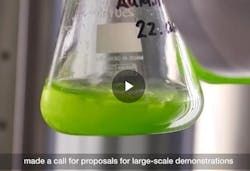VIDEO: All-gas biofuel from wastewater harvested algae project inaugurated
MADRID, Spain – The demo phase of the much anticipated All-gas project, the largest site in the world for the production of biofuel from algae harvested using wastewater, has been inaugurated.
It is now possible to transform wastewater into an algae biofuel which provides four times the distance of conventional biofuels such as sugar ethanol or palm oil diesel, according to project coordinator Aqualia.
Data produced from the Chiclana site in Spain has shown that 20 cars can be powered for a yearly distance of 18,000 km, per hectare of space used for the cultivation of the algae.
The All-gasproject was initiated to demonstrate the sustainable large-scale production of biofuels based on the low-cost cultivation of microalgae.
The complete process chain is designed for a cultivation area of up to 10 hectares, making wastewater treatment energy self-sufficient, and recycling the nitrogen and phosphorus from wastewater into microalgae biomass.
It has taken seven years in total to reach the demo phase, starting life in the laboratory in 2010, before the pilot plant stage in 2013 and then the prototype plant in 2017.
The project is co-financed with €7.1 million by the EU Commission within the FP 7 programme: ENERGY.2010.3.4-1: Bio-fuels from algae.
Project participants include: Aqualia (Spain) as coordinator, BDI-Bio Energy International (Austria), Fraunhofer-UMSICHT (Germany), HyGear (The Netherlands) and the University of Southampton (UK).
The European Union commissioner for energy and climate change action, Miguel Arias Cañete, was present at the site inauguration.
He said: "We are aware that they are complex projects because they involve various companies but once the process has started, decarbonisation in the European Union is now unstoppable.”
The final stage of the All-gas project was started in May 2016, with construction ending in December 2017.
Although the project was originally started with a Volkswagen, in December 2016 it was transferred to SEAT, the Spanish company in the VW group. SEAT is being used to validate the biomethane quality in the long-term tests.
During this time, the full process chain at demonstration scale has been implemented, consisting of:
• A cultivation area composed by four raceways ponds with a surface area of 200 m2 each in which an average of 100 ton/ha-year biomass can be produced.
• A separation and thickening system based on dissolved air flotation (3 units). At this stage the algae broth is concentrated 100 times at very low energy requirement.
• A 750 m3 anaerobic digester in which more than 250 L of biogas per kg volatile solid can be produced. Close to 40 cars can be run for 18 000 km each on the biomethane resulting from conversion of the algae biomass.
• A complete biogas to biomethane upgrading plant coupled to a filling station.
Aqualia said: “This last phase of the project demonstrates that all the steps given above satisfy the expectations and provides an alternative and sustainable response to the reuse of urban wastewater, transforming it into a resource for the circular economy.”
###
Read/watch more
First algae harvest at wastewater biofuel All-gas project in Spain
VIDEO: All-gas algae project update
Algae biofuel: Could it Eliminate the Need for Wastewater Aeration?
About the Author

Tom Freyberg
Tom Freyberg is an experienced environmental journalist, having worked across a variety of business-to-business titles. Since joining Pennwell in 2010, he has been influential in developing international partnerships for the water brand and has overseen digital developments, including 360 degree video case studies. He has interviewed high level figures, including NYSE CEO’s and Environmental Ministers. A known figure in the global water industry, Tom has chaired and spoken at conferences around the world, from Helsinki, to London and Singapore. An English graduate from Exeter University, Tom completed his PMA journalism training in London.
